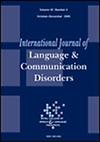Challenges in skill acquisition and memory retention in children with developmental language disorder
Abstract
Background
Understanding memory retention in children with developmental language disorder (DLD) compared with their typically developing (TD) peers enhances our knowledge of memory processes.
Aims
To examine long-term memory consolidation of a declarative object-location task and a procedural symbol-writing task, along with grammatical and lexical skills, in 5-year-old children with DLD and their age-matched peers.
Methods & Procedures
A total of 23 children with DLD and 30 TD peers participated. For procedural memory, children practiced writing a new symbol and were assessed 4 hours and 2 weeks post-practice. For declarative memory, they practiced locating cards until they achieved 75% correct responses and were assessed again 4 hours and 2 weeks post-practice.
Results & Discussion
Children with DLD had fewer correct responses on the declarative-memory object location task with the gap widening significantly from 4 hours to 2 weeks post-training. On the procedural symbol-writing task, children with DLD showed overall lower accuracy. Furthermore, only their TD peers exhibited delayed gains 4 hours post-training in production times, while they narrowed the gap two weeks later. A speed–accuracy trade-off was observed during their symbol-writing practice. These results highlight atypical long-term declarative memory retention and procedural knowledge acquisition in DLD. Consistent with previous studies, declarative memory correlated with lexical scores in both groups, while procedural memory correlated with grammatical scores only in TD peers. Interestingly, long-term procedural learning was linked to lexical abilities in children with TD. Characterizing child performance in short and long intervals following practice may aid clinicians in supporting children with DLD beyond the clinical setting.
WHAT THIS PAPER ADDS
What is already known on the subject
- Current studies emphasize the role of long-term memory in language learning, particularly procedural memory for grammar and declarative memory for lexical knowledge but often overlook longer term performance and non-sleep memory consolidation. Additionally, most research focuses on older children, with few studies addressing younger children at critical language acquisition ages, a gap this study aims to fill.
What this paper adds to the existing knowledge
- The study shows that children with DLD exhibit atypical patterns in declarative and procedural memory post-training. It also establishes correlations between memory types and language skills, highlighting distinct memory challenges in children with DLD compared with their TD peers.
What are the potential or actual clinical implications of this work?
- The clinical implications of this study highlight the need for targeted interventions to address post-practice memory deficits in children with DLD. The findings indicate that children with DLD struggle with both declarative and procedural memory tasks at different post-training intervals, suggesting the necessity for early, ongoing support. Personalized educational and clinical strategies that consider each child's unique memory profile can enhance language acquisition and overall learning outcomes, making tailored interventions crucial.


 求助内容:
求助内容: 应助结果提醒方式:
应助结果提醒方式:


